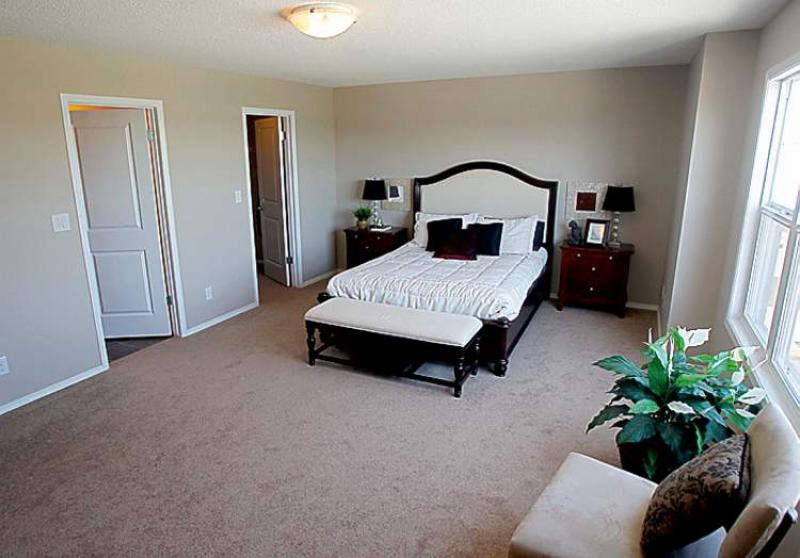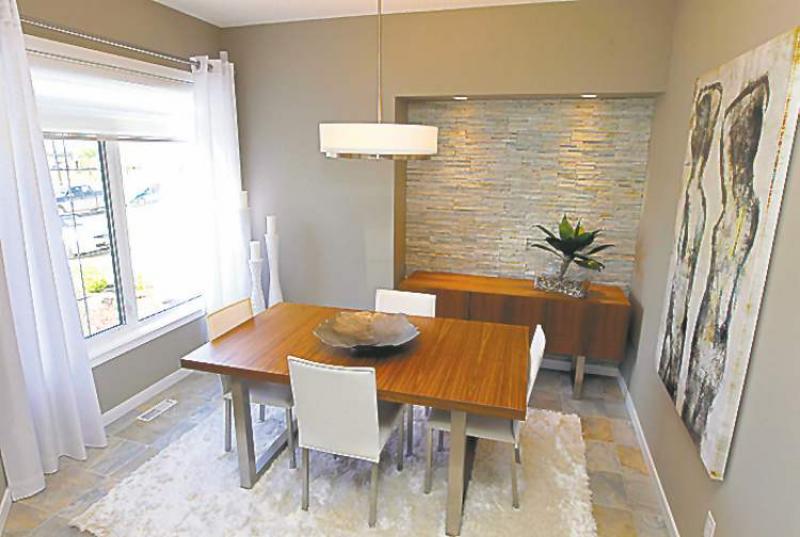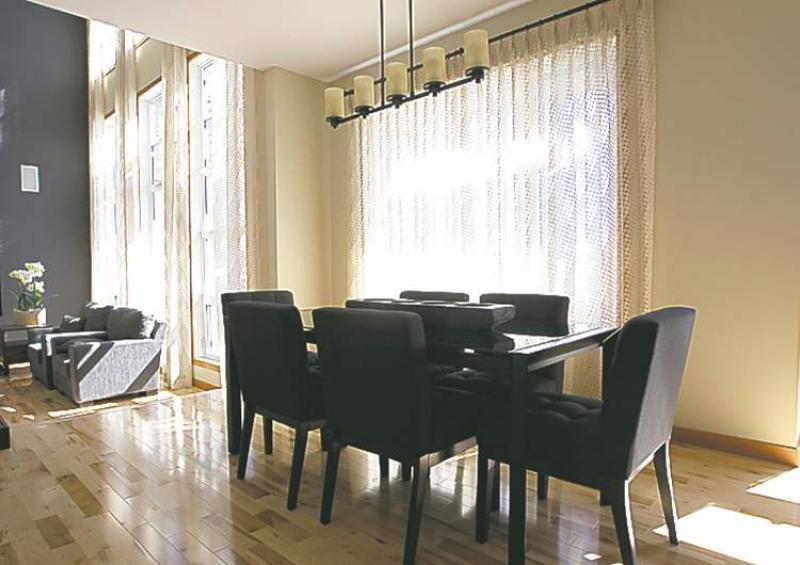New Homes
New Homes
Professional work key to home renovations
Home renovations continue to be a popular topic in Winnipeg and across the country. Our city has the third-oldest housing stock in all of Canada, which generally translates into the need for renovations.
More Manitobans indicated their intent to renovate their homes in the coming year than any other province. Perhaps it's in our nature to see something absolutely fabulous at the Kitchen Bath and Renovation Show, Home Expressions or the Parade of Homes and want to introduce that concept into our current home.
Some look at renovating as an exciting new adventure; others see it as a headache. If you take the necessary steps to avoid certain pitfalls, it can be both exciting and rewarding.
The cheapest deal is not necessarily the best deal. This is a close-knit community, so everyone knows someone who knows someone who is handy with a hammer. That someone may also be willing to do the job on the side for cash, no questions asked. Just think of the money you can save by not paying PST and GST. You'll save even more by not taking out permits, fiddling with cumbersome contracts or worrying about insurance. Bad ideas all around.
Why would you trust your home to someone who does this type of work on the side or in their spare time? The RenoMark logo is your sign of professionalism and confidence. A RenoMark renovator is your insurance and assurance of quality. The RenoMark program is nationally recognized by the Canadian Home Builders' Association and is currently operating in six provinces. Manitoba was the first province to adopt RenoMark.
A RenoMark renovator provides a detailed written contract for all jobs. If you don't have a contract, you don't have any control over the scope of work to be done. Furthermore, when the job is finished, you don't have any proof the job was done. If there's a problem with materials or labour, you're left holding the bag; your "contractor" never officially existed.
A RenoMark renovator takes out all applicable licenses and permits and carries $2 million in liability insurance. If you don't take out the necessary permits, the job never legally happened. In the event of an accident, fire, flood or some other problem, you may find you are not insured for any damage to or resultant from this work. Whoever takes out the permits is the prime contractor.
If someone tries to talk you into putting the permits in your name to save money, you become liable for all liability insurance, workers' compensation and other expenses you are probably not prepared to handle.
Consult the RenoMark and Manitoba Home Builders' Association websites for more information.
Mike Moore is president of the Manitoba Home Builders' Association.
New Homes
Federal mortgage moves don't apply here
On June 22, Finance Minister Jim Flaherty announced a number of changes to residential mortgages and the way in which they are transacted. His rationale is the federal government was introducing these changes to protect Canadians from their own buying habits.
The changes included reducing the maximum amortization period from the current 30 years to 25 years and limiting how much homeowners can borrow on the value of their home from 85 per cent to 80 per cent.
The government will also no longer be in the business of insuring homes that are worth in excess of $1 million. Finally, they are setting cost ratios on household income of 39 per cent for gross debt service and 44 per cent for total debt service.
These changes will result in some recalculations on the part of prospective homebuyers but experts predict the new legislation will not derail the housing market, especially not in Manitoba.
In my opinion, this was a Vancouver, Calgary and Toronto move. The finance minister was not analyzing the situation in Manitoba when he created this legislation. We do not have the same magnitude of concerns in these areas.
The minister actually chose options that were less damaging than some alternatives. I am certain he looked at, but refused to increase, interest rates as a solution. In fact, by seeking out other alternatives, this could be taken as a sign that increasing interest rates is not an option in the foreseeable future.
Historically low interest rates are good news for Manitobans. Economic stability in Canada and Manitoba is key. We are not Europe, nor are we the U.S.
If the minister wants to continue to reduce personal debt but keep Canada's residential market thriving, there are other moves that can assist.
Considerations such as a reduction in government-imposed costs such as additional taxes on new homes would assist the buyer. Adjusting the federal threshold for GST rebates for new homebuyers (not adjusted in over 20 years) would also be a healthy consideration.
This legislation will definitely increase monthly payments for those using a 25-year mortgage, but it will also decrease the total payment over time. It may cause some to delay their purchase, but it shouldn't stop Manitobans from doing so.
Our market has been strong and will continue to remain so for quite some time.
Mike Moore is president of the Manitoba Home Builders' Association.
New Homes
Builders honour three industry stalwarts
The Manitoba Home Builders' Association recognized three long-time contributors with Honourary Life Memberships June 20. Rubin Diamond, Allan Hochman and Guy Hobman were feted by their peers in the residential construction industry for their service to the association.
Mayor Sam Katz opened the evening with a tribute to all three gentlemen and what they have meant to the growth and well-being of Winnipeg. He also presented the MHBA with a Community Service Award in recognition of its 75th anniversary this year.
The mayor noted that MHBA members build over 85 per cent of all new homes in Winnipeg with a goal of affordability and choice. He also noted the work the association does with Habitat for Humanity and Variety the Children's Charity.
Rubin Diamond has been building homes since 1961 with Metropolitan Homes, Kensington Homes and currently Signature Homes. Professionally trained as a civil engineer, Rubin has served the MHBA in many capacities as a director of the Canadian Technical Advisory Committee, as a director of the Manitoba New Home Warranty Board, as a board member of the MHBA for many years and serving as its president in 1971.
Allan Hochman graduated with a degree in Business Economics and began his professional career with Merrill Lynch, working throughout North America. Returning to Winnipeg, he took over the family appliance business.
With his business partners, Allan created Super-Lite Lighting and The Floor Show, two dynamic home supply companies. Allan has served on the Board of Directors of the MHBA for many years and contributed his expertise in growing and developing the Home Expressions and Kitchen Bath and Renovation shows into Manitoba's premier home shows.
Guy Hobman started his career as a chartered accountant but joined Metropolitan Homes. From there, he developed Heritage Homes and finally Greentree Homes, one of Manitoba's most established builders of single family homes, condominiums, commercial properties and land development. Guy has been a director on the MHBA board for many years and served as president in 1981 and 1997. He is the originator of the Parade of Homes, the largest and best Parade in all of Canada.
These men have been giants on behalf of the MHBA for decades. Their commitment, leadership and tireless efforts have ensured that the MHBA has maintained its role as the voice of the residential construction industry.
Their recognition as Honourary Life Members was most deserved and applauded by all.
Mike Moore is president of the Manitoba Home Builders' Association.
New Homes
Shaping up to be good year for home starts
IT was recently reported the City of Winnipeg experienced a record number of housing starts for the month of May. In fact, no single month had as many starts as May of this year since 1989.
The numbers were somewhat staggering if you deal in percentages. This May represented an 80.7 per cent increase over May of last year. Our year to date starts are 49.7 per cent ahead of last year.
What does this mean? Are we in the middle of a tremendous housing boom beyond anything we imagined or is this just the upswing of a standard good year?
There's no arguing 2012 is setting up to be an exceptional year in residential construction. New-home starts are on a pace significantly ahead of 2011, which was also a very good year. Renovation work is also extremely busy as people fix their current homes, either to remain there or improve appearances to maximize its resale point.
Manitoba's economy is good: unemployment is low; interest rates are fantastic with no major increases in sight; Winnipeg's new-home costs are lower compared to much of Canada; immigration is a major boost to our province; and bargain resale homes are very difficult to find.
However, remember that last year at this time we were fighting a flood and much of our efforts went into preventing a disaster. Once that was done, building picked up considerably. This year, we got off to a very fast start with excellent March and April weather. The Spring Parade of Homes was in perfect weather and consumers responded accordingly.
We should also note multi-family starts (condos, town homes, row houses, apartments) more than doubled this year over last. We are all aware of our low vacancy rate in apartments, so any multi-unit construction is going to contribute to a huge demand, not create a surplus. Single-family detached starts are up 20 per cent, a much more reasonable figure.
Therefore, before anyone panics about a housing bubble or crisis by analyzing our numbers, we can see 2012 is going to be a very good year for new-home starts but not beyond anything conceivable.
Things have a way of balancing in Manitoba and our consumers have a very good handle on their spending. An existing need is being filled and will continue to be filled by new-home builders.
Mike Moore is president of the Manitoba Home Builders' Association.
New Homes
Cautious optimism continues in housing market
I recently attended meetings of the Canadian Home Builders' Association and listened to two economists predict not only Canada's economic future but also that of most of the rest of the world.
Of course, what interested most of the room was how this was going to affect the housing market. The usual clichés were used. "Cautiously optimistic," and "long-term slow growth" were popular phrases. Naturally, the world situation started with Europe, where a slow recovery was projected to be experienced just before another recession lasting until 2014. The Asian economy could experience a slowdown, too.
How does that impact Canadian housing? If Canada loses two major trade partners for our natural resources and manufactured goods, we experience an export problem that hurts our economy, which slows down our confidence in buying larger-ticket items.
On the plus side, they called for the U.S. economy to turn the corner, expand by 2.5 per cent this year, implement spending cuts and get rid of previous incentives and tax cuts. Manufacturing and housing in the U.S. are showing signs of improvement. This will strengthen the American dollar and probably decrease the overvalued Canadian dollar, which will in turn help our ability to export and trade worldwide.
Canada has posted strong job gains in the private sector and there is a call for plus two per cent GDP growth for each of 2012, 2013, and 2014. There was some concern about increasing household debt but consensus that it had not reached a crisis situation. It was acknowledged that the centre of balance for Canada had shifted to the west as energy, rather than manufacturing, was leading the way. All four western provinces were projected to have the highest growth rates.
As for the residential construction industry, they made it very clear that there was no bubble, no oversupply and that new home prices would continue to increase by reasonable and healthy margins as opposed to erratic jumps.
The construction industry as a whole is at its peak level of activity. Canadians continue to spend on renovations at an ever-increasing pace with Manitoba leading the way.
Finally, and most importantly to the room, they agreed that mortgage and interest rates were not going up any time soon. It would be several years before any kind of slight adjustment might be made. This was good news to all.
Mike Moore is president of the Manitoba Home Builders' Association.






